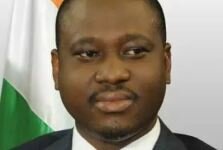National Chairman of the All Progressives Congress, John Odigie-Oyegun held a World Press conference last Wednesday in Abuja where he alleged that the Presidency was planning to persuade the National Council of States to postpone the February 14 presidential elections on the grounds that quite a substantial number of eligible voters are yet to collect their biometric voter’s cards.
That National Council of States meeting eventually held Thursday and the body, which comprises former leaders of the country, governors of the 36 states of the country, the leadership of the national assembly and a long list of other important personalities, is mainly an advisory one.
Everyone was waiting to hear the position of the council on the issue of the postponement of the election. After meeting for about eight hours, the council said the election should go ahead as scheduled. The council also agreed that elections could be postponed in areas still being affected by the Boko Haram insurgency.
Governor Rochas Okorocha of Imo State told reporters after the meeting that INEC assured the Council it was ready to conduct the elections and that the distribution of the permanent voter cards was going well.
Okorocha also said the nation’s security chiefs gave every assurance that they were ready for the elections but voiced concern about holding elections in areas under the control of Boko haram.
But Ondo State Governor, Olusegun Mimiko later told journalists that the council advised INEC to reflect over the concerns raised by members and the suggestion made by those who spoke in taking a decision that would allow for the conduct of smooth elections.
The meeting by the way was presided over by President Goodluck Jonathan.
Speaking toTV360 shortly after the meeting HumanRights Lawyer and Senior Advocate of Nigeria, Femi Falana said the Council of State is an advisory body whose decision is not binding. he said Nigeria does not need the approval of the body to hold elections.
On the issue of postponing elections in places still being affected by the insurgency, Falana faulted the decision of the Council, saying not holding elections in the States affected by the Boko Haram insurgency could lead to a constitutional crisisi
Among those that attended the Council meeting were former Presidents and Heads of State — Shehu Shagari, Yakubu Gowon, Muhammadu Buhari, Ibrahim Babangida, Abdulsalami Abubakar and Interim National Government President Ernest Shonekan. Former President Olusegun Obasanjo was however absent.
Other participants were Senate President, David Mark, Speaker of the House of Representatives, Alhaji Aminu Tambuwal, and former Chief Justice of the Federation, Justice Musdafa Belgore.
Governors of Anambra, Kogi, Katsina, Kano, Osun, Imo, Sokoto, Nasarawa, Adamawa, Niger, Lagos, Bayelsa, Rivers, Kaduna, Kebbi, Zamfara, Kwara, Ogun, Ondo, Plateau, Cross River, Enugu and Delta states were also in attendance.
Also present were Governors of Bauchi, Akwa Ibom, Jigawa, Edo, Ekiti, Gombe, acting governor of Taraba while Abia, Oyo and Borno were represented by their deputy governors.
The National Security Adviser to President Goodluck Jonathan, Col. Sambo Dasuki (rtd), FCT Minister Bala Muhammed and the Minister of Justice and Attorney-General of the Federation Mohammed Adoke also attended.
The Chairman of the Independent National Electoral Commission, [INEC], Attahiru Jega, and the nation’s security chiefs made presentation to the meeting, which started around 11.56 a.m. and ended after 7.pm.





